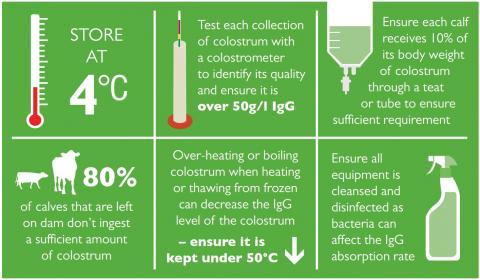Colostrum – how much is enough?
Producing productive replacements is essential for any dairy farmer’s future enterprise. Here are some helpful cost effective tips to help with calf rearing management.
Colostrum is the first and most important contribution to a calf ’s health. If a calf is not fed a sufficient quantity and quality in the early stages of life this may result in; slower growth rates, increased risk of developing disease therefore higher treatment and labour cost, and is linked with reduced milk production in the first and second lactation.
AHDB dairy research has produced a quick solution for colostrum management using the three Q’s:
- Quantity - the first feed should consist of 10% body weight, followed by a second feed of colostrum within 12 hours of birth
- Quality - colostrum contains antibodies known as immunoglobulins (or IgG). A newborn calf requires colostrum which contains at least 50g/litre of IgG – this can be tested by using a colostrometer - anything under 50g/litre should not be used
- Quickly - colostrum should be administrated either by a nipple or tube within two hours of birth. It is also important to remember that the IgG from the dam’s udder dilutes and decreases over time, so ensure the dam is milked as soon as possible after calving
Consistency of feeding times, quantity and concentration of milk replacer are vitally important. New research has demonstrated that the traditional two litres twice a day is no longer considered sufficient and that most calves should be getting at least six litres of milk replacer per day. Concentration should be 125g of milk replacer per litre of water, equivalent to 650g a day.
Revisit and revise your calf rearing systems to ensure not only optimal calf welfare, but also to improve labour efficiency and welfare. When benchmarking and producing costs of calf rearing it is important to calculate man hours spent with the calves and ensure your system is cost and labour efficient. There are various systems and it is important to identify the most suitable for your business.
Further advice can be funded through the Farming Connect Advisory Service.
Something to think about?
Twice a day bucket feeding of 40 calves from birth to weaning can take up to 77 man hours – 115 minutes per calf at a cost of £13.68 of labour per calf. Group feeding of calves can cut this cost by 80%.
Calf rearing can be laborious and time consuming for any farm. However, in trials conducted by Moorepark, the Irish Dairy research centre, there was no difference in weight gain between calves that were over four weeks old being fed once a day compared with a group fed twice a day, but there were savings in labour cost.
Colostrum facts
Top tips
- Always carry a thermometer in the calf shed. Any signs of loss of appetite should be tested as high body temperature can be the first early signs of respiratory disease. This can be identified two to three days before there are any clinical signs - prevention is key!
- Kneel test - carry out a daily kneel test, lower your knee to the calf ’s bedding, if your knee is damp when you get up the house bedding is not dry enough and the calves will become damp and lose heat, which is vital for weight gain.
- Calf sheds should be well ventilated but draught free at calf level.
- Wean the calves gradually over a period of a week to decrease stress levels
- Isolate any calves that start scouring immediately. Ensure they are fed electrolytes and do not stop feeding milk replacer as they need the energy to get better.
- Ensure all staff follow the same procedure of preparing and mixing milk replacer to ensure consistency in the quantity, quality and temperature at which it is fed.

